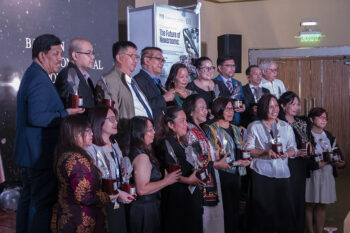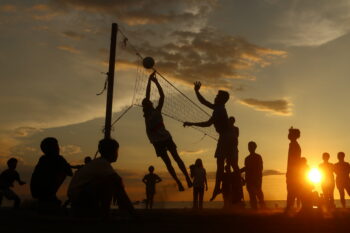DAVAO CITY (MindaNews/24 Aug) — I sat over a few bottles of SanMig lites a few nights ago with a friend who just arrived from abroad. He asked several pointed questions about the still ongoing MILF peace talks: why can’t the military just wipe them out? Why compromise or give in to the demands of armed rebels when they should instead be made to answer for rebellion, taking up arms and violating the laws? Why are they allowed to establish camps that defy government? Why are they getting concessions more than those given to others who generally remained peaceful and law abiding? Does this mean that others will have to first take up arms before they get equitable attention and benefits? Why engage in peace talks with them, in the first place? Interesting and thought provoking questions indeed.
ERAP’S WAR POLICY. I answered him by anecdotal recollections. President Erap Estrada during his incumbency declared all out war against the MILF, attacked and overran rebel camps in 2000. In fact, President Erap’s popularity rating reportedly went up due to his iron fist Mindanao policy against the rebels. Indeed the main MILF camp, the famous Camp Abubakar fell into AFP control. Many rebels were killed; their commanders were on the run. But when the smoke of war cleared, the MILF was still around. Although badly bruised, it still remained intact. They just moved to other camps and re-grouped their forces. They still retained the support of their Bangsamoro constituencies. Their rebellion continues to this day, although prospects of a negotiated peace and the ceasefire have momentarily quieted the guns of war.
COST OF WAR. I told my friend that the question that always begs an answer is this: what is the cost of war? And is it worth it? I explained to him that the “cost” referred to here is not only in terms of the peso cost of the conflict ( bullets, bombs, armaments, logistics, etc) but the more unquantifiable, real SOCIAL COST on civilians whose lives are destroyed, disrupted, damaged due to conflict and fighting. The answer to this question surprised my friend. Unknown to him, about one million (yes, 1,000,000) Mindanawons were directly affected by the Estrada war policy. Thousands of families were displaced and their normal lives disrupted, including the actual loss of lives of both soldiers, rebels and civilians caught in the crossfire. This is not to mention the irreparable damage to the island region, now still being perceived as a war-zone and a troubled land to the outside world.
The extent of the damage of the Estrada war policy was so extensive and deep that during my whole nine (9) years in Malacanang in the Arroyo administration that followed, the healing of the wounds of war and the normalization of lives and the return and rehabilitation of those displaced continued to be a high priority task of the Mindanao agency I headed. Again, during the Arroyo administration, the AFP went on an offensive (in 2003) and dislodged MILF guru Hashim Salamat and his forces from his hideaway in Buliok, Pikit in the periphery of Liguasan Marsh. The MILF again suffered heavy casualties and dispersed in various directions. The civilian population suffered the most. When I left government in 2010 or about 10 years after the first offensive, it was an unfinished task; the work to help those who suffered the so-called collateral damage of war was not yet fully done. Up to this day, we still ask the questions: did the war policy quell the rebellion? Despite its obvious superiority, did the government win the war? Was the social cost of war worth the outcome? Is the military solution the answer?
Yes, we need the AFP to periodically remind the rebels that they cannot continuously operate with impunity. In fact, such military offensives are also “incentives” for the rebels to stay the course in the peace process. It also served as a stern warning that walking away from the negotiating table could bring peril to them and to their cause. But, can this bring lasting peace? We know the answer.
ALL-OUT PEACE. Here’s another cogent recollection I shared with my friend.
I recall when President Arroyo took over from President Estrada in 2001, she immediately reversed the Erap all-out war policy and enunciated the policy of all- out peace and the primacy of the peace process. Among the first things PGMA did upon assumption right after Erap left Malacanang was to issue a Letter of Instruction, which laid down the framework of the pursuit of peace through negotiated settlement. It was to pick up from where President Ramos left off. I was her first chief negotiator to put back on track FVR’s peace initiatives with the MILF.
RE-STARTING TALKS. I cannot forget that day in 2001 when I first entered an MILF controlled territory somewhere in the boundary of Maguindanao and North Cotabato. Immediately after I got the marching orders from PGMA to ” re-start” the peace talks, I brought relief assistance to thousands of evacuees, mostly MILF families. It was also to give me “cover” for my secret, exploratory, informal face-to-face meeting with an emissary of then MILF Chairman Hashim Salamat. I remember meeting him who was wearing a bull cap inside a dark, small hut with all windows shut. I can’t recognize him if I meet him again.
The late Ustadz Salamat’s favorite nephew, the late businessman Ebrahim” Toto” Paglas, my close friend, brokered the ice breaker. Former AFP chief of staff, Gen. Hermogenes ” Jun” Esperon Jr., then a colonel and brigade commander in North Cotabato refused to let me go alone and volunteered to escort me but he had to shed off his military uniform to disguise as my civilian companion in a hostile territory. The risk paid off.
In a few weeks, then OPAPP Sec. Eduardo Ermita shook hands with MILF’s Kagi Murad in Kuala Lumpur signaling revival of peace talks. After three months, I signed in June 2001 in Tripoli, Libya as chief negotiator, the landmark Agreement for Peace that served as the framework and roadmap in the subsequent conduct of peace negotiations. By the way, it was in that Tripoli trip when I met face to face with the late strongman Moammar Khadafi in his desert tent in Sirte. (Of course with his pet elephants trucked in by container vans in the background served as fascinating props.)
DEFEATING REBELS. One poignant event during my work in the Arroyo government also stood out that I also considered instructive as I pondered on those questions posed by my “balikbayan” friend. I related to him what happened during a Malacanang high-level closed door, command conference of the security sector. One Army general was a bit candid about his reservations on a ceasefire mechanism with the MILF, which we discussed. He was describing it as unfairly tying the hands of the soldiers while they fought the rebels. I sensed it was a common sentiment among the uniformed participants.
To cut him off, an exasperated high official snapped a question: “Tell me honestly, General. Can you and the AFP decisively and militarily defeat the MILF?
If your answer is in the affirmative, there’s no more need for this meeting!” The Army General did not answer. No one in the room stirred. After a while of silence, the high official merely said: “I hear none.The answer is clear. Let us now proceed.”
I pondered for a while on the significance of what took place. Many years passed and up to this day, that episode kept coming back. It was a reality check. It simply taught me that force of arms does not and cannot extinguish the Bangsamoro grievances; that the root causes of rebellion must be addressed; that a negotiated settlement is the way forward.
WHY TALK PEACE? The inevitable question that my friend asked was: why hold peace talks, in the first place? Well, here are a few of my thoughts that I passed on to him:
First, government recognizes that the rebel group has valid grievances that must be addressed and redressed;
Second, government being on a high moral ground must be ready to grant concessions to address those grievances;
Third, improving the lives of the affected constituencies, especially those deprived, is key;
Fourth, government cannot decisively defeat the organized rebel group in armed combat without great social cost to the general population;
Fifth, peace engagement with mainstream rebels who are willing to negotiate can isolate the extremists and the radicals;
Sixth, the government due to its superiority can win battles but it cannot win the war unless it wins the hearts and minds of those who had suffered injustices and exclusion;
Seventh, social cohesion or understanding amongst diverse groups in Mindanao and their acceptance of their respective diversities and differences help bring about peace;
Lastly, peace through a negotiated settlement, although difficult than conveniently and easily pulling the triggers of war, is more desirable, durable and sustainable.
TASK NOT EASY. The work for a negotiated peace settlement is not the proverbial “walk in the park.” Accommodating the aspirations of those who have already forsaken normal processes of redress and to be done by government that must adhere to those processes (like the Philippine Constitution that the rebels disavow and reject) is not an easy task.
If crafting an agreement is already that difficult, how much more if we talk about IMPLEMENTATION? Indeed, the most crucial is HOW TO IMPLEMENT what has been signed and to meet the high expectations of all. I’ve seen it up close with the 1996 peace agreement with Nur Misuari’s MNLF that up to this day is still troubled by implementation issues.
In the case of the present agreement with the MILF, we are still not there. As of today, we are still awaiting the release by Malacanang of the final draft of a bill that if passed by Congress can get us going.
There’s still a long road ahead, I told my friend. He handed me a bottle of SanMig lite as if satisfied with what I said. It was only then that I realized I was ready for another bottle. MindaViews is the opinion section of MindaNews. Advocacy MindaNOW is a syndicated column of Jesus “Jess” Dureza who worked in Malacanang in various capacities and is now president/chairman of the Philippine Press Institute, a national association of newspapers and publications. You may reach him at jessdureza@gmail.com)







